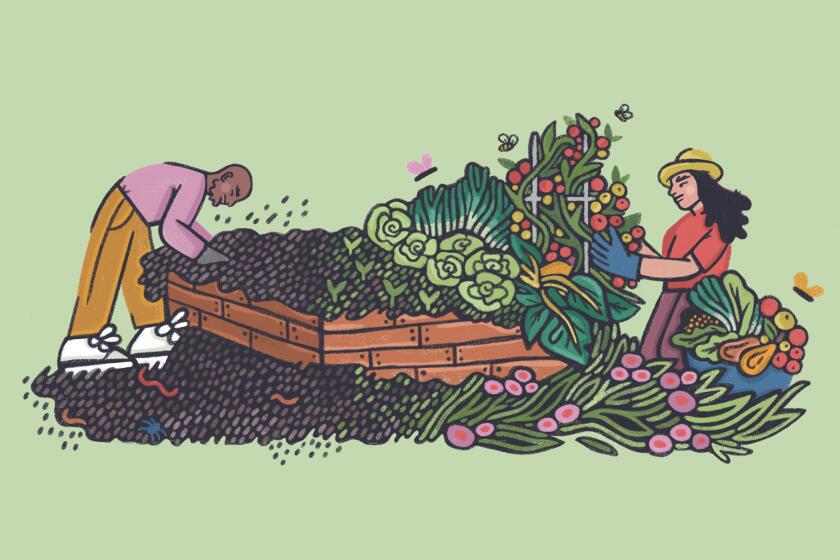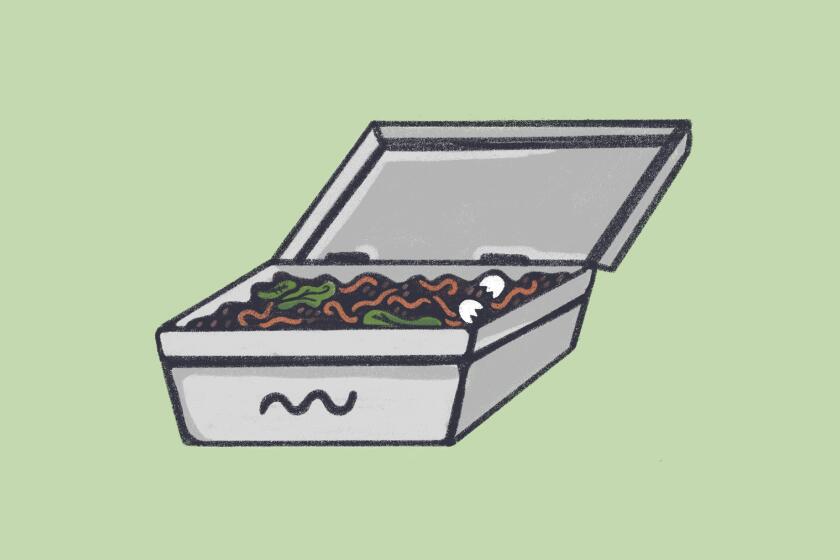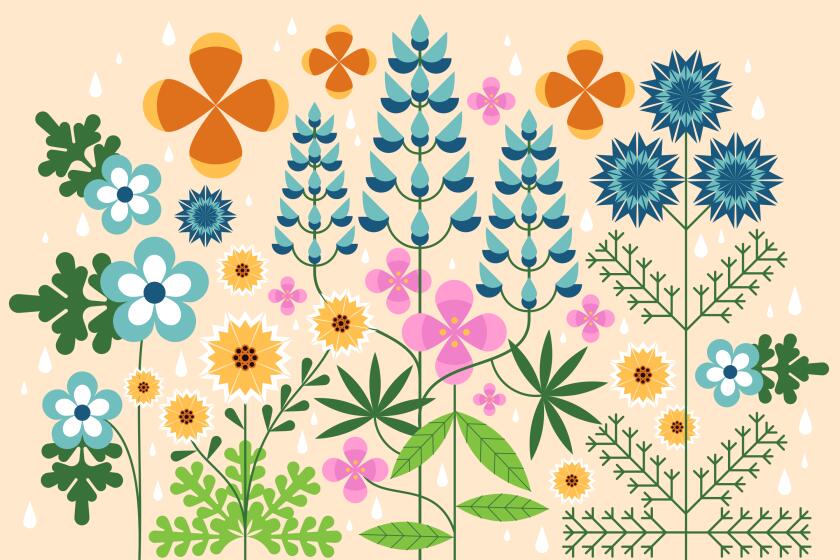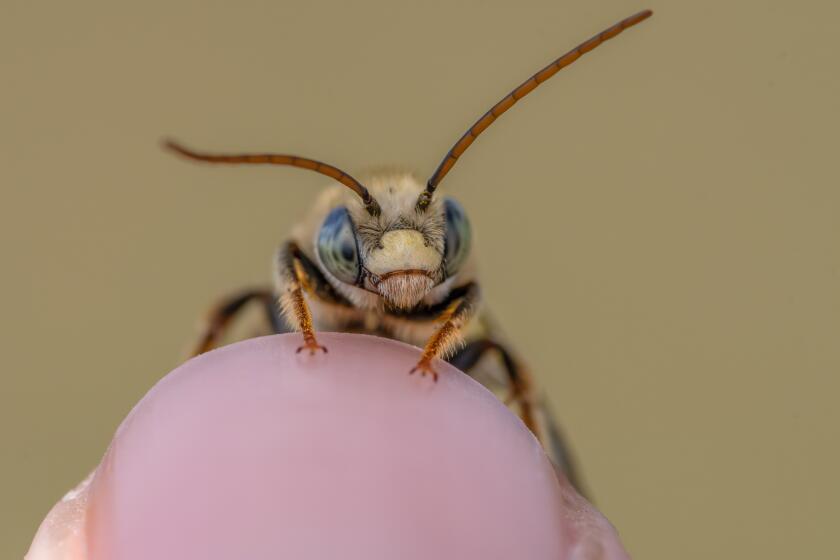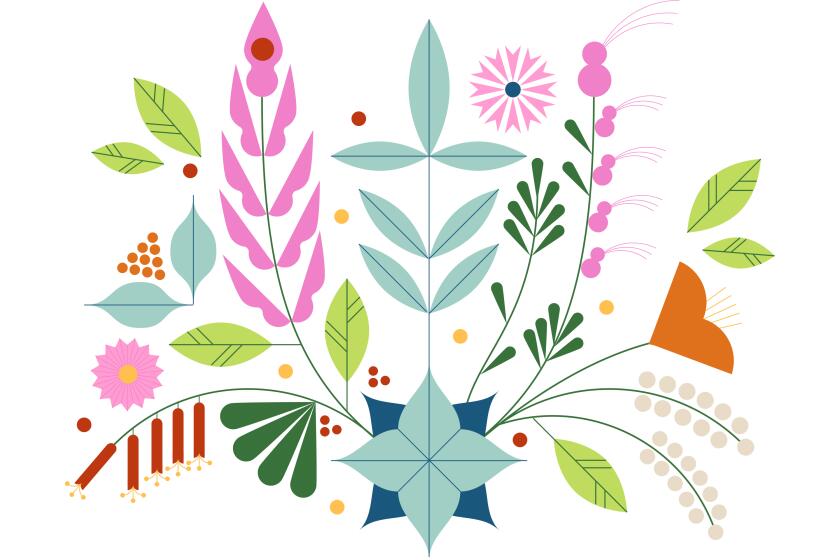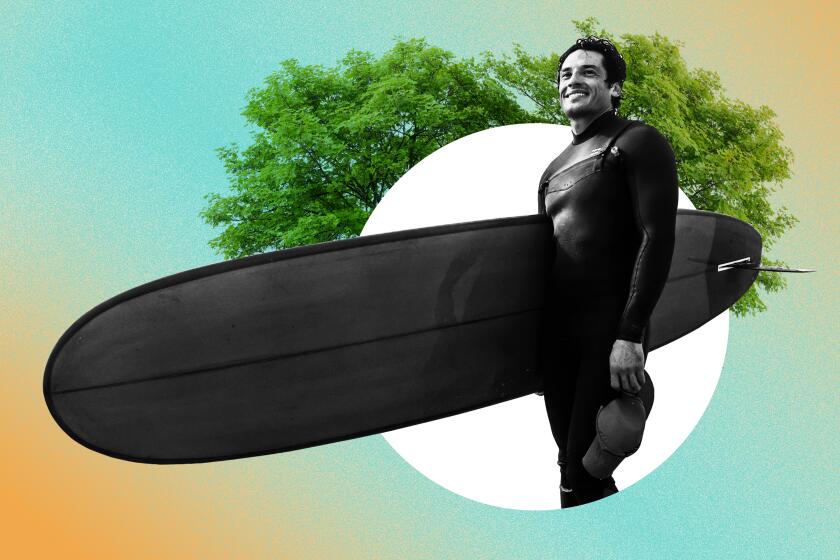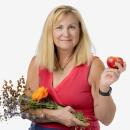Composting is now mandatory in L.A. Here’s how to reap rewards beyond the green bin
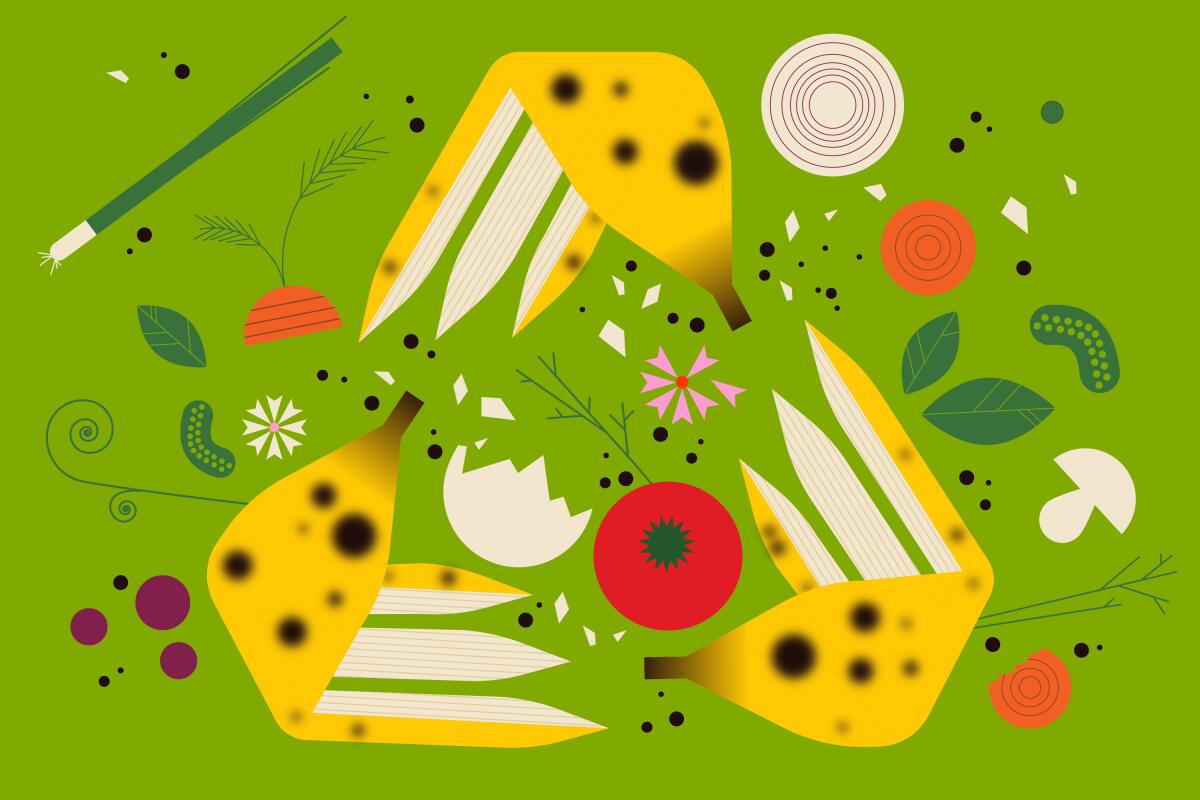
- Share via
It took a year past the state deadline, but mandatory curbside composting has finally arrived in the city of Los Angeles. As of Jan. 16, residents are now required to toss their chicken bones, veggie scraps and other food waste into their green bins instead of their nonrecyclable garbage destined for the landfill.
It’s not really a major issue: You have to scrape your food waste into some receptacle, right?
“Nearly 40% to 50% of the trash we collect curbside is compostable,” Michael Martinez, founder of L.A. Compost, said last year, when the law was enacted. “We need to stop seeing food ‘waste’ as trash and redefine our vocabulary to see it as a resource, something that needs to be transformed and reinvested back into the soil.”
A new law requires Californians to recycle food scraps and leftovers. What is composting? What can you — and can’t you — compost? We’re here to help.
The point of the law is to remove organic waste from our landfills to reduce methane emissions and slow the need for new places to dump our waste. Senate Bill 1383, passed in 2016, requires cities to divert 75% of their organic waste out of landfills by 2025. Separating food waste from garbage became mandatory statewide on Jan. 1, 2022, although several jurisdictions, including Los Angeles, delayed implementation to get their programs — and composting facilities — up and running.
You aren’t required to personally make compost; all you have to do is separate your food waste, and cities and other jurisdictions will take it from there. But honestly, if you have a garden or a yard or even potted plants, making compost is a pretty easy and inexpensive way to enrich the compacted, depleted soils around our homes and public areas. Compost adds nutrients, attracts beneficial microbes and — perhaps most important — helps create a loamy soil that more easily absorbs and retains the water it receives.
I’m a longtime composter, so these days I have four waste receptacles in my kitchen — one each for recycling, landfill garbage, food waste for my compost pile and a separate one for food waste I don’t want in my compost, like cheese and meat scraps. My home compost pile doesn’t get hot enough to kill any possible pathogens created by rotting meat and dairy products, so I leave the composting of those items to industrial-strength composting centers.
Here are some options for composting in very small spaces, if you don’t have room for a traditional compost pile or a garden.
Like many other jurisdictions in California, Los Angeles is providing residents with free kitchen pails to hold their food waste before they take it to their larger green bins outside, although you have to make an appointment to pick up your pail at one of several distribution centers in the city.
You don’t have to use the city-provided containers, however; you can invest in a handsome metal one (like the one featured in our 2022 holiday gift guide for the eco-conscious) or use a recycled plastic tub or even an old bowl although you’ll probably want to empty your container often if it doesn’t have a lid.
Honestly, it’s not that hard to make a compost pile, especially if you just stick to eggshells, coffee grounds and plant waste, as I do. There are plenty of how-to guides online, and tons of free classes and workshops in February and beyond. Here’s a sampling:
- L.A. Sanitation offers free composting workshops almost every Saturday morning at one of its four locations, where city residents can pick up compost bins and worm bins for the discounted price of $20 each (more for nonresidents).
- Los Angeles County Public Works also offers free composting workshops most Saturdays through its Smart Gardening program. In February there are classes on Feb. 4 in West Covina, Feb. 11 in Walnut and Feb. 18 in Burbank. Backyard compost bins ($40) and worm compost bins and African red worms (Eisenia fetida) ($65) can be purchased at the end of each workshop.
- Long Beach’s Environmental Services Bureau offers free composting workshops at least once a month, including Feb. 25.
- Sustainable Little Toyko sponsors workshops in using a pickling method known as bokashi to compost food waste in buckets under your sink. Its next Hiro’s Bokashi Club Workshop is Feb. 11. The workshop is free but the necessary equipment and supplies cost $25.
- L.A. Compost has more than 34 community compost hubs and drop-off sites around Los Angeles, including several farmer’s markets, where people can drop off food waste and volunteer and get hands-on composting lessons. The organization also offers compost workshops throughout the year.
Here are some other garden- and plant-related activities for February. If you’d like to include events in our monthly garden calendar, email information by the third week of the preceding month to jeanette.marantos@latimes.com.
When should you plant wildflower seeds in Southern California? With all the rain, January is a good time to scatter. Otherwise, November and December are best.
Feb. 1-4
Theodore Payne Foundation Winter Plant Sale 8:30 a.m. to 4:30 p.m. at 10459 Tuxford St. in Sun Valley. Members receive a 15% discount and nonmembers receive a 10% discount on all plants, seeds, and Theodore Payne Foundation gear. Admission is free, but reservations for cars are required because of limited parking spaces. eventbrite.com
Feb. 2
Gardening for Butterflies, a free class from 1 to 2 p.m. at the Norman P. Murray Senior Center, 24932 Veterans Way in Mission Viejo, presented by the UC Cooperative Extension Master Gardeners of Orange County. The course discusses the types of butterflies in our region, the plants they need and examples of native plants and other nectar plants that attract them. The class is free but registration is required. mgorange.ucanr.edu
Feb. 3
Santa Monica Mountains Fund restoration in the Yerba Mansa meadow at Rancho Sierra Vista in Newbury Park from 9 a.m. to noon. Volunteers age 5 and older will help plant hundreds of native plants grown from locally collected seed. Participants should bring water, sunscreen and a sun hat and wear hiking attire — closed-toe shoes, pants and long-sleeve shirts. Gloves and tools will be provided. Admission is free but reservations are required. eventbrite.com
Artist-turned-community scientist Krystle Hickman quit the 9-to-5 life to find her passion: photographing California’s endangered native bees.
Feb. 4
How to plant tomatoes from seeds, a free class taught by the UC Cooperative Extension Master Gardeners of Orange County 10 to 11 a.m. at the Orange County Great Park Farm + Food Lab, 8000 Great Park Blvd. in Irvine. Learn how to plant tomatoes from seed and transplant and care for the seedlings. mgorange.ucanr.edu
Feb. 4 & 11
Ventura Land Trust clean-up from recent flood damage, 9 a.m. to 1 p.m. at the Big Rock Preserve on Feb. 4 and Willoughby Preserve on Feb. 11. Participants must sign a liability release waiver and RSVP online. Volunteers will be asked to remove inorganic material from the preserves, collect invasive arundo grass and begin to restore the preserves’ trails. Volunteers will get more details upon registration. venturalandtrust.org
The California Native Plant Society’s conference was more inclusive than ever. Here are some surprises, as well as November native plant events in Los Angeles.
Feb. 5
Los Angeles Mycological Society 39th Wild Mushroom Fair 9 a.m. to 3 p.m. at the South Coast Botanic Garden, 26300 Crenshaw Blvd. in Rolling Hills Estates. The event includes mushroom walks, growing demonstrations, workshops and vendors. The fair is free with $15 admission to the garden ($11 seniors and students, $5 children ages 5-12. Members and children 4 and younger enter free). Garden tickets have timed admission dates and should be reserved online. lamushrooms.org
Feb. 9
Prioritizing California Native Plants for Butterfly and Moth Preservation at the Southern California Horticultural Society meeting from 7 to 10 p.m. at the Friendship Auditorium, 3201 Riverside Drive, in Griffith Park. Chris Cosma, a graduate student at UC Riverside’s Evolution, Ecology and Organisimal Biology Department, will discuss his research into how climate change is affecting moths and their interactions with native plants in California. His talk will also include information about monarchs and other butterflies. Doors open at 7 p.m. for announcements and a plant forum; program begins at 7:30 p.m. Admission $5 (members enter free). socalhort.org
Feb. 11
Pot It Like It’s Hot hands-on workshop, 11 a.m. to 1 p.m. at Flyplant, 1801 E. 7th St. in downtown L.A. Learn when plants are ready to be repotted, what kind of soil mix to use and how to properly repot, feed and care for plants. Tickets start at $50 and include admission to the workshop, a 4-inch plant and 5-inch pot of your choice, organic soil mix, complimentary mimosas and snacks. eventbrite.com
Arlington Garden weekend workshop, 9 a.m. to noon at 275 Arlington Drive, Pasadena, includes instruction in regenerative gardening techniques while volunteers help ready the Arlington Garden for the Theodore Payne Foundation Native Plant Garden Tour in April. Free, but participants are asked to register online. eventbrite.com
Feb. 12
South Coast Cactus & Succulent Society meeting features a talk about the renovation of the Huntington Library, Art Museums, and Botanical Gardens’ desert gardens from curator John Trager, 1 to 4 p.m. at the South Coast Botanic Garden, 26300 Crenshaw Blvd. in Rolling Hills Estates. Admission is free for members and their guests. southcoastcss.org
Feb. 13
Gabe Verduzco, the man who hunts invasive beetles threatening SoCal’s urban trees, is the speaker at the Los Angeles Garden Club meeting 9:15 a.m. to 12:45 p.m. at the Griffith Park Visitor’s Center Auditorium, 4730 Crystal Springs Drive, in Griffith Park. Verduzco will discuss his adventures in searching for beetle infestations and offer tips about how to spot infestations and protect trees from these tiny beetles. losangelesgardenclub.wixsite.com
Gabe Verduzco is the surfing “garden bro” working to save SoCal’s urban forests, one invasive beetle hole at a time.
Feb. 18
Mushrooms of Southern California walk with Jess Starwood, forager, chef and author of “Mushroom Wanderland: A Forager’s Guide to Finding, Identifying, and Using More Than 25 Wild Fungi,” 9 a.m. to 3 p.m. The day starts with a walk through the Ojai Meadows Preserve to look for and identify mushrooms, and then a demonstration about cooking wild foods, plus other hands-on activities. Admission is $145; register online at herbwalks.com
Los Angeles Spring Seed Swap, Compost & Gardening workshop, noon to 4 p.m. sponsored by the Plant Plug and Project 43 Team Post Centers, at 6841 Crenshaw Blvd. in Hyde Park. The workshop includes a mini seed library of three packs of seed, plant history, care tips and tutorials in composting and seed extraction. Tickets are required for admission; they are $20 each or $8 for people who have seeds to share. Children 13 and younger enter free. eventbrite.com
Feb. 18-March 11
Three-Part Gardening Series with botanist Terry Huang, director of living collections, learning and engagement at South Coast Botanic Garden, at the Theodore Payne Foundation nursery, 9 a.m. to noon on Feb. 18, Feb. 25 and March 11. The classes are geared toward beginner gardeners who want to gain practical knowledge and theoretical knowledge about plants and gardening. Sessions will include learning about different seed treatments, hands-on work in the Theodore Payne gardens and gardening maintenance. Admission is $420 ($350 for foundation members.) eventbrite.com
Feb. 24-25
Tomatomania! 2023 kickoff sale, El Cajon Water Conservation Garden, 12122 Cuyamaca College Drive West in El Cajon from 9 a.m. to 3 p.m. This is the first of Tomatomania’s 11 roving pop-up sales throughout Southern California from late February into April. The annual sales typically include about 200 varieties of tomatoes and 100 varieties of peppers grown by local farmers for Tomatomania! owner Scott Daigre. Venues in Los Angeles, Orange and Ventura counties are scheduled for March and April. tomatomania.com
Feb. 25-26
Tomatomania! sale, Mission Hills Nursery, 1525 Fort Stockton Drive, in San Diego from 8 a.m. to 5 p.m.; the second of Tomatomania’s 11 roving pop-up sales throughout Southern California from late February into April. tomatomania.com
Feb. 27
“Mini-Catts: Delightful Cattleyas in Miniature” is the topic for the South Coast Orchid Society of Long Beach’s meeting 7 to 9 p.m. at the Whaley Park Community Center, 5620 E. Atherton St. in Long Beach. Longtime orchid grower and judge Peter Lin will discuss his work in creating many hybrid cattleyas orchids. Admission is free. southcoastorchidsociety.com
Feb. 28
Tomato talk at the Monrovia Garden Club, 7 p.m. at the First Presbyterian Church, 101 E. Foothill Blvd., in Monrovia. Master gardener Judy Gomez talks about growing tomatoes. The club’s social time begins at 6:30 p.m. Admission is free. facebook.com/groups/MonroviaGardenClub
More to Read
Sign up for The Wild
We’ll help you find the best places to hike, bike and run, as well as the perfect silent spots for meditation and yoga.
You may occasionally receive promotional content from the Los Angeles Times.
